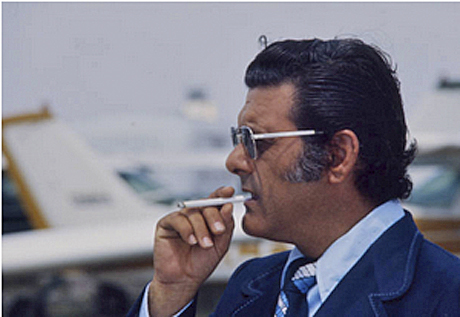
- Articles
An “American James Bond” — Anti-communist Freedom Fighter, Frank Sturgis
In the noted biography, Flawed Patriot (2006) by former CIA agent and author Bayard Stockton, CIA legend Bill Harvey, was introduced to President John F. Kennedy as “America’s James Bond.”(1) Harvey was indeed a charismatic legend in the CIA, but two other, almost equally unknown American heroes, could also vie for the title. One of them is Feliz Rodríguez Mendigutía, the indomitable subject of the book, Shadow Warrior, who, among his many other accomplishments, helped track and capture Che Guevara in the jungles of Bolivia in 1967.(2)
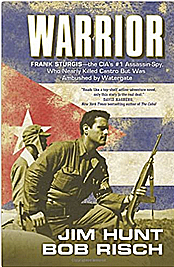
The third contender for “America’s James Bond” title is probably the least known of the three men, and he happens to be the subject of the book I review in this essay, Frank Angelo Fiorini, aka Frank (Anthony) Sturgis.(3) Of these three valiant men, only one of them was reputed to be (although with little evidence and certainly not in the league with the fictitious James Bond, British agent 007), a womanizer (Harvey). The second man was a Cuban-American (Rodríguez), and the third (Sturgis) of Italian-American ancestry.
Harvey began his career as a CIA agent after being a seasoned lawyer and then policeman; Rodríguez and Sturgis began their careers right out of high school at the tender age of seventeen, signing up as young paramilitary soldiers in the service of American forces. The thread that is common to all three characters is not only unswerving patriotism and the eager participation to enter the heated conflict between the Russian Bear and the American Eagle — but perhaps more ardently, entering the contentious fight for the turbulent and troublesome Caribbean island. As Sturgis himself expressed to the Rockefeller Commission on CIA activities in the U.S. in 1975: “It was about Cuba… it was always about Cuba.”(4)
The incredible real life adventures of Frank Sturgis is recounted in this riveting book, which reads like a novel, but it is incredibly all true! The tome is a biographical tribute of a nephew (Jim Hunt) to his uncle, a real-life American hero, who gave everything for his country, the comfort and niceties of his home and family life, the profits and security of his businesses, and ultimately his life. This action-packed book is well written and well-documented. So much so, that we are able to understand Frank’s deep passions, motives and intentions, although we may not condone many of his actions, legally or morally. But it becomes clear, though, it was love of freedom, unselfishness, and patriotism that guided Frank’s actions, which in turn took him through untold dangers and perils. Frank is incredibly resourceful in crisis, generous to friends in distress, always loyal to his country, undaunted in adversity, and perpetually fearless in facing danger.
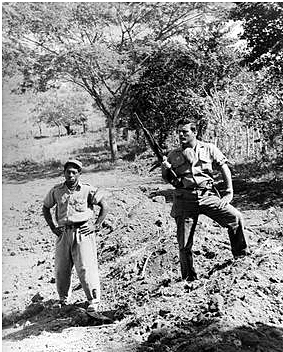
But what activities did he actually carry out in the interest of his country? Who was this Frank Sturgis? He was a young, World War II Marine charging the beaches in the South Pacific, Okinawa, and Guadalcanal; brave Yankee friend of and gunrunner for Fidel Castro in the Sierra Maestra during the Castro brothers fight against Cuban President Fulgencio Batista in 1957-58; CIA agent and freedom fighter against communism and Castro’s totalitarian dictatorship (1959-1993); friend of and go-between among Latin American presidents, including Miguel Ydígoras of Guatemala, Rómulo Betancourt of Venezuela, and Luis Somoza of Nicaragua (1959-80s); scourge of repressive dictators, such as Papa Doc Duvalier and Rafael Trujillo; sometimes contact with Mafiosos, such as Meyer Lansky, Santo Trafficante, and Sam Giancana; Watergate conspirator and burglar (1972-74); resourceful CIA operative who did everything in the service of his country in four continents; and adventurer, army and guerrilla trainer in Angola, Honduras, El Salvador, Nicaragua, and the Florida Everglades (1960s-1993 until his death); and always the lover of freedom, compassionate freedom-fighter, and anti-communist world warrior. A fellow CIA agent Rolando Martinez once called Sturgis, “A tough guy with a big heart.”(5) He also had a sense of humor; when the ATF raided his camp in the Everglades on March 9, 1993, and asked him about the Cuban-American commandos he was training, Frank said: “We are just a bunch of Boys Scouts learning about ecology.”(6)
I have often heard the expression that CIA collection of intelligence (espionage) and unconventional warfare is “devious and dirty business.” But how is a freedom-loving nation to protect herself from political, military and scientific espionage and to protect the liberty of her citizens from unfriendly and totalitarian nations that want to harm and undermine the country — a nation that has protected individual liberty and political freedom not only for herself but also for her loyal allies? These are the tasks to which Frank Sturgis dedicated his life until his mysterious death in 1993. Men and women such as William Harvey,(1) Feliz Rodríguez,(2) Frank Sturgis,(3) and Martha D. Peterson(7) risked their lives so that the rest of us can live in freedom and even have the right to criticize them and their shadowy national security operations.
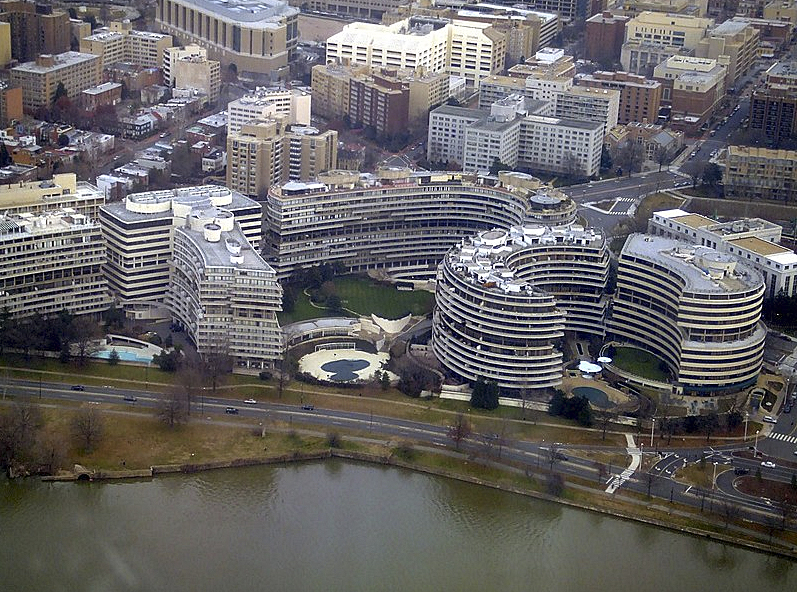
Chapters 8 and 9 of the book cover the Watergate scandal from the perspective of the “plumbers,” the maligned Watergate burglars who were arrested and unjustly convicted for a political crime. And a political crime it was. All four of them were ardent anti-communist Cuban-Americans, except for Frank, who was virtually an honorary Cuban-American. They had known each other for many years from the anti-Castro CIA wars of the 1960s: Bernard “Macho” Baker, Virgillo Gonzalez, and Rolando Martinez. All of them had been told by White House officers, Howard E. Hunt and G. Gordon Liddy, they were investigating the flow of illegal money from Fidel Castro to the Democratic National Committee (DNC) to help elect a liberal Democrat to the U.S. presidency who was more amenable to Castro, and that national security was at stake. The operation had been sanctioned from the highest echelons of power, above the CIA and FBI! In reality, it was an illegal political operation stemming from the White House to get dirt and political secrets from the Democrats to help President Richard Nixon get re-elected. The four men became the scapegoats for the operation, along with G. Gordon Liddy, who also refused to talk. The whole scandal can be summarized as told by Barker: “We went in. We got caught. Nixon lost his job.”(8)

The legal trials and tribulations of the four defendants is poignantly narrated. Judge John Sirica’s unjust severity against the defendants is described in convincing and knowledgeable details. It becomes clear the judge was more set on seeking “to break” the Watergate case and gain notoriety in the process than in dispensing justice. Draconian provisional sentences of 50 years (more than is given for homicides in D.C.) were given to the defendants in an effort to make them “talk” and to warn other higher-up defendants what was at stake if they proved recalcitrant to confess. Even Chesterfield Smith, the President of the American Bar, deplored “the use of the criminal sentencing process as a tool for further criminal investigations of others.” Even President Nixon, who had done little for the four defendants after they got caught, felt pity for them, and told Bob Haldeman, “God damn it, if they’d been communists you’d have the Washington Post and the New York Times raising hell about their civil rights.”(9) Frank and the Cubans felt betrayed. They never blamed Hunt, Liddy, or even Nixon, but Frank did blame the CIA and became angry at the agency, blaming it for the debacle.
It is of interest the CIA was erroneously blamed and became the escape goat for the Bay of Pigs debacle in 1961; Frank correctly blamed JFK, his former idol, for that disaster, and now in 1972-73, the CIA was blamed by Frank for Watergate! For example, Frank believed that James McCord, a CIA technical expert had deliberately (and at the behest of the CIA leadership) sabotaged the Watergate mission to bring down the Nixon presidency. He later, fearless as ever, resumed the fight against communism, but remained embittered with the CIA, working from outside the agency. And in the same vein, unfortunately, the authors, toward the middle of Chapter 9, “Watergate — Law and Disorder,” go on a tangent, somewhat losing track of their biography, trying to involve the CIA in the Watergate calamity; where in reality, the Nixon administration was responsible and paid the heavy price. The CIA, incidentally, is cited erroneously, as giving the order for the execution of Che Guevara after his apprehension in La Higuera in 1967. In fact, although the CIA with Feliz Rodríguez did help track Che Guevara, Bolivian sergeant Mario Teran received his orders to execute Guevara from the Bolivian President, Rene Barrientos.
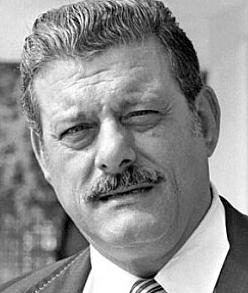
Chapter 10 about the JFK assassination is also tendentious, a bit redundant, and highly speculative, based on Frank’s various conspiracy theories and ideas, which are frankly not based on first hand knowledge, or documented facts or evidence. One of the authors, Jim Hunt his nephew, does successfully exculpate Frank of any direct involvement in the JFK assassination, as he personally provided Frank with an alibi on November 22, 1963, which virtually exonerates the freedom fighter from the erroneous accusations that he was one of the alleged gunmen in the JFK assassination “conspiracy.” Moreover, the “bums,” who were photographed near the grassy knoll and previously confused with Howard Hunt and Frank Sturgis, were subsequently and definitively identified as the vagabonds the Dallas police had questioned and released.(10) (Their photos and comparisons are also included among the numerous illustrations in Warrior between pages 160 and 161.)
With Chapters 11 and 12 based on Frank’s adventures in Angola and Central America, respectively, the book regains its former tempo, suspense, and action-packed narrative. The final pages complete the well-deserved and poignant tribute to Frank Sturgis, the fearless adventurer and the loving and caring family man, by his nephew and author, Jim Hunt. Frank’s short illness and death was almost certainly an assassination by his mortal enemy Fidel Castro, unless an autopsy proves us wrong, but twenty years after the fact may be too late. The sudden illness and mode of death is reminiscent of the KGB assassinations in London of Georgi Markov in 1978 and more recently of Alexander Litvinenko in 2006. Here is the description of Frank’s illness by authors, Hunt and Risch, who found Frank had been, as always, in excellent shape and health:
“Two weeks before, when Frank was training anti-Castro commandos at his beloved camp in the Everglades, he complained about what looked like an insect bite on his back. It itched and swelled and then went away after a few days. At the time Frank recalled that in July of that year he had suffered a similar ‘bug bite’ while standing outside PUND [the anti-Castro Miami group, Partido de Unidad Nacional Democrático] office in Little Havana. It produced symptoms exactly like the one he subsequent received at the Everglades.”(11) Frank was admitted to the VA Hospital, diagnosed as having “cancer” and was dead in a few days. No autopsy was done. Fidel Castro should be implicated as he was in the JFK assassination.(12)
In conclusion, Warrior: Frank Sturgis is copiously illustrated, fully annotated, and has an excellent index. If you like books delving into recent American history, cold war intrigue, espionage, hot spot wars, and generally, adventure stories of daring but unsung American heroes, this book is for you. Get it, read it, and pass this copy on and keep another copy in your library!
* This essay is a book review of Warrior: Frank Sturgis —The CIA’s #1 Assassin-Spy, Who Nearly Killed Castro but Was Ambushed by Watergate by Jim Hunt and Bob Risch (2011), Forge, New York, NY, 336 pages. There is an excellent YouTube video entitled “JFK, Sturgis, Hunt and The Bay of Pigs,” which may be of additional interest to our readers.
References
1) Stockton B. Flawed Patriot: The Rise and Fall of CIA Legend Bill Harvey. Potomac Books, Dulles, VA, 2006, p. 120.
2) Rodriguez FI, Weisman J. Shadow Warrior: The CIA Hero of a Hundred Unknown Battles. Simon and Schuster, New York, NY, 1989.
3) Hunt J, Risch B. Warrior: Frank Sturgis — The CIA’s #1 Assassin-Spy, Who Nearly Killed Castro but Was Ambushed by Watergate. Forge, New York, NY, 2011.
4) Ibid., pp. 12, 262-277
5) Ibid., p. 175
6) Ibid., pp. 276-277
7) Peterson MD. Widow Spy: My Journey from the Jungles of Laos to Prison in Moscow. Red Canary Press, Wilmington, NC, 2012.
8) Warrior: Frank Sturgis, Op. cit., p 209
9) Ibid. p.185
10) Ibid., pp. 231-234
11) Ibid., pp. 19-20, 295
12) Faria MA. Fidel Castro, Cuban Intelligence and the Assassination of JFK. GOPUSA.com, November 21, 2013. Available from: https://haciendapublishing.com/faria-fidel-castro-cuban-intelligence-and-the-assassination-of-jfk.
Written by Dr. Miguel Faria
Miguel A. Faria Jr., M.D. is Associate Editor in Chief and World Affairs Editor of Surgical Neurology International. He is Clinical Professor of Surgery (Neurosurgery, ret.) and Adjunct Professor of Medical History (ret.), Mercer University School of Medicine. Dr. Faria is the author of Cuba in Revolution: Escape From a Lost Paradise (2002). His website is https://HaciendaPublishing.com.
This article may be cited as: Faria MA. An “American James Bond” — Anti-communist Freedom Fighter, Frank Sturgis. HaciendaPublishing.com, December 8, 2013. Available from: https://haciendapublishing.com/an-american-james-bond–anti-communist-freedom-fighter-frank-sturgis.
A much shorter, unillustrated version of this article appeared in the Macon Telegraph on December 19, 2013 with the heading Faria: An American ‘James bond.’
Copyright ©2013 Miguel A. Faria, Jr., M.D.